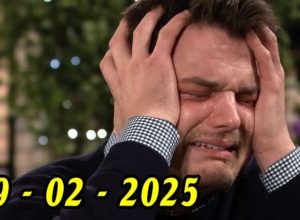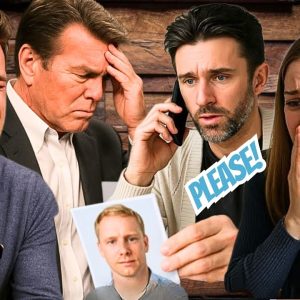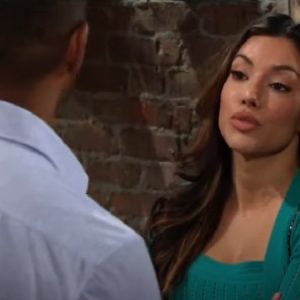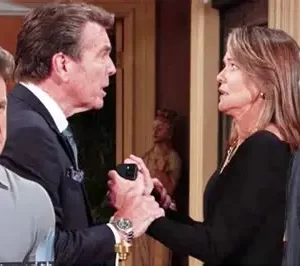In Genoa City, storms rarely come from the sky. They emerge from the tangled hearts and battered alliances of those who believe themselves masters of fate. This time, the tempest consumed Nikki Newman, a woman once revered for her strength and grace, now cornered by desperation, risking everything for her son’s life. The shadows in which Nikki found herself were of her own making, born from years of compromises, dangerous liaisons, and choices that once seemed bold, but now haunted every step. Her mind reeled as she realized the only way forward was through Cain, a man whose ambitions had never been clearer or more dangerous. Cain was not a monster by birth, but circumstances and perhaps Carter’s relentless manipulation had twisted him into a figure capable of anything. It was unclear to everyone, even to Cain himself, whether he was acting of his own volition or simply a pawn moved by Carter’s cunning hand.
The death of Damian had sent tremors through the social circles of the wealthy and the powerful. But what truly terrified Nikki was the possibility that Nick’s abduction was not a random act of vengeance, but part of a master plan, a domino forced to fall so that greater secrets would tumble into the open. Nick, always a fighter, had been reduced to a shell of resolve and pain. The wound at his side, deep, bloody, throbbing, threatened to steal from him not just consciousness, but the very hope that had sustained him through countless betrayals and losses. Sharon and Billy were there, frantic but ill-equipped, their frantic efforts a mix of faith and fear. Sharon’s hands trembled as she tried to stem the bleeding, recalling what little she knew about first aid. Her mind clouded with memories of better days and the dread that this time she might lose him for good. Billy, stubborn as ever, refused to admit his own panic, forcing himself to be useful, even as the blood on his hands grew tacky and cold. It was Sally who stepped forward, the most unlikely of angels in this crucible of suffering. Unlike Sharon or Billy, Sally’s experiences had forced her to acquire a certain pragmatism. She assessed Nick’s wound with clinical calm, barking orders to Sharon to keep pressure, to Billy to find clean cloth – anything, everything that might keep Nick conscious a little longer. It was not lost on Sally that the clock was ticking, that every second wasted brought them closer to the edge, and yet there was a clarity in crisis, a sense of purpose she had not felt since arriving in this city of schemers.
Meanwhile, Cain presided over his captive audience with a cold detachment that veered between arrogance and anxiety. He announced to the guests that there was no self-service, that they were stranded, isolated, powerless. But Cain’s bravado was a brittle thing. Inside, he wrestled with the consequences of every action. He had told himself that he was in control, that this was his game. But even he could not escape the feeling that the walls were closing in. For all his planning, the illusion of control had started to crack the moment blood was spilled.
Billy was not one to accept defeat, especially when those he cared about were at risk. Unbeknownst to Cain, Billy began to search the perimeter, probing every locked door, checking every window for weakness. He whispered to Sharon when Cain was out of earshot, promising her that he would find a way to get help, that this nightmare would not be the end. But in truth, even Billy was at the mercy of forces he could not understand. The phone in Cain’s pocket, a device that connected him to the world and perhaps to salvation, remained a wild card. Cain’s secret was that his phone still worked. The signal was weak, and the risk of being caught was high, but it was a lifeline, one that he guarded fiercely. He convinced himself that keeping it was a matter of security, of controlling the flow of information. But in moments of weakness, he considered the possibility of using it to call for help. The dilemma gnawed at him. Could he trust Nick enough to let him use the phone, knowing that Nick’s first instinct would be to save his own skin? Or was there some higher purpose to be served by keeping Nick alive, bleeding but breathing, until Carter revealed his endgame?
Nikki, on the outside, but emotionally imprisoned, searched for allies among the shifting allegiances of Genoa City. She confronted Victor, pleaded with him to put aside their differences and focus on saving their son. Victor, ever the strategist, weighed his options, torn between the urge for vengeance and the practical need for unity. For Nikki, every minute spent arguing with Victor felt like a betrayal of her maternal instincts. But she knew that without his resources, her chances of rescuing Nick were slim. As night fell, the air in Cain’s hideout grew heavier, the tension thick enough to choke on. Nick’s breathing became shallow, his skin clammy. Sally fought to keep him awake, whispering stories of hope, of redemption, of a future beyond the pain. Sharon clung to Nick’s hand, her tears silent but relentless, each one a confession of love, regret, and the helplessness of a mother who cannot save her child. Billy kept watch, his muscles coiled, waiting for the moment when courage and opportunity would intersect.
But it was Cain who faced the ultimate choice. The plan, if there ever was one, had unraveled. Carter’s influence pressed in from the shadows, an ever-present reminder that Cain’s actions would be judged not just by the law, but by the ones he claimed to love. He toyed with the idea of letting Nick use the phone, of calling for medical help, rationalizing that a dead Nick would bring more trouble than a living one. Yet, the voice in his ear, sometimes Carter’s, sometimes his own, reminded him that weakness would not be forgiven, that there could be no turning back. The guests, restless and fearful, began to realize that the situation was deteriorating. Whispers spread. Alliances formed and shattered in the space of a glance. Some questioned Cain’s motives. Was he truly the architect of their torment or just another victim of Carter’s machinations? Others saw opportunity, a chance to seize control, if only they could act quickly enough. As the hours dragged on, the line between captor and captive blurred. Nikki, driven by love and guilt, prepared to risk her life for a chance at redemption. Cain, haunted by the specter of Carter, contemplated an act of mercy that might damn him in the eyes of his accomplice. Nick, on the edge of consciousness, fought to stay alive, to find some fragment of hope in the darkness. Sally, Sharon, and Billy wove their own threads of courage and desperation, unwilling to give up even as the odds grew longer. And somewhere beyond the walls, Carter watched his plan unfolding exactly, or perhaps disastrously, as he intended. In the end, Genoa City would remember this night as the moment when the true cost of power and ambition was revealed, not in headlines or whispered gossip, but in the choices made when all illusions of control were stripped away. The question remained, who would survive the reckoning? And what price would they pay for their freedom?
The True Killer Revealed
In the tangled world of Genoa City, nothing ever remains hidden for long, least of all the motives behind a murder or the truth about those willing to sacrifice everything to keep their secrets. This time, the game had turned deadlier, and the chessboard was slick with suspicion, betrayal, and the silent dread of being accused for a crime you may not have committed. In the eye of this storm stood Cain, desperate to shield himself, but also grappling with the increasingly uncontrollable consequences of Carter’s manipulations.
Cain had always trusted his instincts, but even he could sense that the tides had turned against him. The noose was tightening, not only from the police investigation, but from within his own camp. Carter, the assistant, who had once seemed indispensable, was now the source of gnawing doubt, a shadowy figure whose loyalty seemed to shift with the wind. When Carter let slip something he should have kept to himself, Cain’s suspicions sharpened. The assistant, either through arrogance or accident, revealed knowledge of the very knife used in Damian’s murder – knowledge he should not have possessed unless he had been involved much more deeply than he claimed. The revelation hit Cain hard. For days, he had operated under the assumption that he was being set up, that forces outside of his control were conspiring to see him fall. But now, with Carter’s words echoing in his mind, he began to see the situation in a darker light. Perhaps Carter had never been the loyal subordinate, but instead the architect of the entire ordeal, manipulating evidence and perception with chilling precision.
Cain pressed Carter relentlessly, demanding the truth in a way that left no room for denial. The once competent assistant now squirmed under the weight of Cain’s interrogation, his carefully constructed mask starting to slip. It became increasingly apparent that Carter had not only been aware of the knife hidden beneath Nick’s sink, but may have even orchestrated the planting of it there. This single detail sent ripples through every conversation, every strategic calculation. Who stood to gain from framing Nick? Who would risk so much, play such a dangerous game to see the wrong man accused? As suspicion circled, the old question resurfaced: Who really killed Damian?
Publicly, Nick remained the prime suspect, with mounting evidence pointing his way. Yet, those close to the situation saw the inconsistencies. Why would Nick, already under so much scrutiny, risk hiding a murder weapon in his own home? Why did Carter possess such intimate knowledge of its whereabouts? Was Carter himself the murderer? Or was he acting at someone else’s behest, moving pieces around the board to protect a bigger secret or a more powerful master? The implications ran deep, threatening to engulf everyone connected to Damian’s death. If Carter had planted the knife, he either wanted to frame Nick for reasons yet unclear, or more deviously, to protect someone even higher up the food chain.
Cain, always cautious, considered the possibility that he was being set up as well. Carter could have been positioning him as the fall guy, using Nick as a smokescreen while quietly tying up loose ends behind the scenes. The walls closed in as the investigation gained momentum. Cain’s confidence began to erode as he realized the scope of the conspiracy. He confronted Carter with increasing ferocity, hoping to break him and extract the truth before it was too late. But Carter, slippery as ever, played every angle, at times feigning innocence, at times shifting blame onto Cain himself. In the midst of this chaos, questions proliferated. Did Carter actually kill Damian, or did he simply happen upon the aftermath and seize an opportunity? Had he seen Damian’s lifeless body and decided to implicate Nick, or was he merely a pawn following someone else’s orders? More troubling: Did Cain’s own actions make him look guilty, unwittingly playing into Carter’s hands?
Desperation forced Cain to consider his own culpability. He replayed every encounter, every whispered conversation, every moment of doubt. Carter’s most damning claim was that he knew Cain would look guilty, and that his efforts had been to protect his boss from a prison sentence. But Cain recognized the flaw in this logic. If Carter was so intent on protecting him, why allow the evidence to point directly at Nick? Was it a diversion, or something even more sinister, a way of tying Cain’s fate inexorably to the outcome, ensuring his silence through shared complicity?
Outside, the drama played out under the scrutinizing gaze of law enforcement and the press. Nick, battered and desperate, pleaded his innocence, but found his credibility eroding with every new revelation. Those who cared about him – Sharon, Billy, even Sally – rallied to his defense, searching for any thread that could unravel the mystery and clear his name. But the knife under his sink, the bloodstains, and Carter’s cryptic remarks painted a different picture, one that Nick could not easily refute. As the hours turned into days, Cain knew that time was running out. His only hope of escaping the web was to expose Carter’s true role in the conspiracy. But Carter was a master at covering his tracks, always a step ahead, always ready with another layer of deceit. Each confrontation grew more perilous as trust between the two men evaporated into thinly veiled threats and desperate bargaining. The deeper Cain dug, the more he uncovered disturbing truths, not just about Carter, but about himself. His willingness to blur ethical lines, to manipulate those around him, had created fertile ground for betrayal. Carter, in many ways, was a reflection of Cain’s own darkness, an embodiment of all the choices made in haste or arrogance. Now faced with the possibility that his own assistant might be the architect of his downfall, Cain was forced to confront the limits of his ambition.
Tension reached a fever pitch when Cain, acting on a hunch, demanded that Carter explain precisely how he knew about the knife. Carter’s answers grew evasive, riddled with inconsistencies. He spun tales of overheard conversations, of cleaning duties and chance discoveries. But Cain recognized the signs of a man lying to save himself. Driven to the brink, Cain realized that his only hope lay in getting Carter to confess, not just to him, but publicly, before the entire fragile edifice of deceit collapsed. But Carter, sensing that the game was nearly up, shifted tactics once again. He argued that he had tried to help Cain, that he knew how guilty Cain would look and had tried to manipulate the evidence in his favor. He spun a story about wanting to protect his employer, not out of loyalty, but out of a shared understanding of how power operated in Genoa City. In his version, he had stumbled upon the aftermath of Damian’s death and seized the chance to control the narrative, framing Nick to buy time and distract the authorities.
Cain, for all his faults, understood one thing clearly: whoever controlled the story controlled the outcome. He pressed Carter harder, threatening to go to the police with what he knew. The stakes had never been higher. If Carter confessed, perhaps Cain could salvage something from the wreckage – his freedom, his reputation, or at the very least, a chance to start over. But if Carter stayed silent, the noose would continue to tighten inch by inch until both men were dragged down together. The true brilliance and tragedy of Carter’s manipulation was that it left everyone looking guilty. Nick, accused by circumstance, Cain damned by association, Carter himself, always on the periphery, shaping events but never fully exposed. And through it all, the question of Damian’s murder remained unresolved, a festering wound in the heart of Genoa City. As the investigation accelerated, Cain realized that the only way out was through the truth, no matter how painful or dangerous. He prepared to confront Carter one final time, this time with witnesses, determined to extract a confession and end the cycle of lies. But as the two men faced off, it became clear that Carter would not go quietly. He threatened to expose secrets Cain had long buried, to turn every ally into an enemy, and ensure that no one emerged unscathed. In the end, the outcome rested on who broke first. Would Cain have the courage to risk everything on the hope of justice? Or would Carter’s web of deceit snare yet another victim? Only time would tell, as Genoa City braced itself for the truth, a truth that would shake its foundations and change the lives of all involved forever.
Nikki’s Life in Peril
In the suffocating atmosphere of Genoa City, where every alliance is shadowed by suspicion, and every glance hides the threat of betrayal, the case of Damian’s murder refuses to be resolved with any simple answer. While much of the attention has centered on Carter, a figure whose ambiguous loyalty and secretive actions have cast a long shadow over the entire investigation, whispers begin to spread that perhaps Carter is not the sole architect of this grim affair. What if someone else had wielded the fatal weapon? What if the city’s oldest, darkest grudges had combined into a force so stealthy, so cunning, that even Carter was being outmaneuvered without realizing it?
The tension reaches a fever pitch as the week draws to a close. Nikki finds herself truly cornered, emotionally and physically, in a way that shakes even her practiced poise. The city may know Nikki as a survivor, a woman who has navigated heartbreak, scandal, and even the grip of addiction. But this is a new and terrifying arena. She is being hunted, possibly literally. A secret swirls, and Carter himself is preoccupied interrogating others, his attention divided, his hands not nearly as in control of the strings as he believes. It’s Friday, and Genoa City feels as if it’s holding its breath, teetering on the edge of a revelation that could destroy more than reputations.
Until now, most assumed that Carter’s cold calculation pointed to his guilt. The evidence seemed to gather around him: the way he manipulated timelines, sowed doubts, hinted that he alone held the answers to questions no one else even thought to ask. But the deeper the investigation digs, the more cracks appear in this assumption. Carter cannot be everywhere at once. His apparent omnipresence is only smoke and mirrors. If someone else truly killed Damian, then the entire foundation of the case, and of the city’s sense of justice, begins to quake.
In the uneasy aftermath of Damian’s shocking murder, Genoa City stood on the edge of chaos. Whispers filled the corridors of Newman Enterprises. Dark secrets lingered behind every elegant door, and suspicion gripped the city’s most powerful families like a vice. The air was thick with paranoia, a sense that beneath the polished surface, something far more sinister lurked, ready to swallow anyone who dared look too closely.
At the center of it all, Nikki found herself trapped, her world closing in as she struggled to untangle the knots of guilt, fear, and doubt tightening around her throat. From the moment the news of Damian’s death spread, the city’s attention zeroed in on Carter, a man known for his ruthless ambition and his willingness to do whatever it took to get what he wanted. He had enemies in every corner of Genoa City, but it was his recent proximity to the deceased that put him at the top of everyone’s suspect list. Carter, however, seemed almost amused by the rumors, his confidence growing with every passing day as the investigation stalled and the trail grew cold. Yet, not everyone was convinced of his guilt. The circumstances of Damian’s death were too elaborate, too calculated for someone so brazen, and that was where Nikki’s nightmare began.
In the days leading up to the fateful Friday, Nikki had sensed that something was terribly wrong. It was a subtle shift at first, a shadow passing over her life, a chill that refused to dissipate even in the warmth of the Newman estate. Carter had been relentless, interrogating her with an intensity that bordered on obsession. But Nikki couldn’t shake the feeling that he was playing a part, that his questions were less about finding the truth and more about keeping her distracted. She began to notice the strange calls at night, the anonymous notes slipped beneath her door, the feeling of eyes watching her, even when she was alone. The pressure mounted, and as the investigation’s focus remained stubbornly fixed on Carter, Nikki’s isolation deepened.
On that pivotal Friday, everything came to a head. Nikki was summoned to an isolated suite at the Grand Phoenix, supposedly to meet with Victor for a private discussion about the family’s legal troubles. But when she arrived, Victor was nowhere to be found. Instead, the room was dark, the curtains drawn, and the only sound was the soft ticking of a grandfather clock in the hall. As Nikki stepped inside, the door closed quietly behind her, and an icy dread washed over her. She was not alone. At that exact moment, Carter was across town, being grilled by Chance in an interrogation room thick with tension. Every detail of his alibi was picked apart, every relationship scrutinized, but Carter seemed completely unshaken, even smug. His lawyers hovered in the background, but Carter barely acknowledged them. Instead, keeping his eyes fixed on the clock as if he was waiting for something, something only he knew was about to happen.
Back at the Grand Phoenix, Nikki’s fear escalated. The suite felt like a trap. Every window a mirror, every shadow a threat. She tried calling Victor, but the signal was jammed. Her messages bounced back, each failure heightening her panic. She began to pace, desperate for a way out, when suddenly a voice, a voice she did not recognize, echoed through the darkness. It was low, menacing, taunting her with intimate knowledge of her past mistakes, her regrets, her deepest fears. The unseen tormentor recounted details of Damian’s death that no one outside the investigation should have known, suggesting that Nikki herself was not just a bystander, but a target.
Meanwhile, across the city, Victor felt an unfamiliar unease. His instincts had always been his greatest asset, and now they screamed at him that Nikki was in danger. He made a series of rapid calls, his voice sharp, his orders absolute. Within minutes, Victor assembled a team, mobilizing both corporate security and trusted family allies. He understood better than anyone that the chaos surrounding Damian’s murder was more than a simple crime of passion. It was a calculated act designed to upend the balance of power in Genoa City, to break the Newmans when they were at their most vulnerable. As Victor closed in on Nikki’s location, the identity of the true killer began to take shape. The evidence pointing to Carter suddenly felt flimsy, almost deliberately planted. If Carter had been across town during the crucial window, busy making a public scene, ensuring he’d have dozens of witnesses, then someone else had orchestrated the attack. Someone who wanted the Newmans to be distracted by infighting and finger-pointing while the real danger moved in the shadows. And that someone, Victor realized, had now set their sights on Nikki.
Inside the suite, Nikki’s tormentor began to unravel. No longer satisfied with psychological games, the figure emerged from the darkness, cloaked and gloved, face obscured by a hat pulled low. Nikki tried to fight, her desperation lending her strength, but she was quickly overpowered. The attacker spoke of justice, retribution, and a promise kept – hints that suggested a connection to Damian, perhaps even a long-buried vendetta finally coming due. But Nikki, battered and breathless, refused to surrender. In her mind, she replayed the faces of her family, the strength that had seen her through countless battles. She would not let this be her end. In a final act of defiance, she managed to activate a hidden panic button Victor had insisted be installed after the last threat on her life. The silent alarm raced through the hotel’s network, and within seconds, Victor and his team burst into the suite.
The confrontation was swift, brutal, and chaotic. The attacker tried to escape, but Victor’s men blocked every exit. In the struggle, the assailant’s disguise was ripped away, revealing a face from Genoa City’s past, a figure long thought gone, consumed by jealousy and rage. The revelation stunned Nikki, Victor, and the entire city. Carter, meanwhile, was exonerated, his own schemes and manipulations suddenly dwarfed by the true killer’s motives.
In the aftermath, as the police led the real murderer away in handcuffs, Nikki clung to Victor, her body shaking, but her resolve unbroken. She had faced death and emerged stronger, her trust in Victor reaffirmed, her faith in herself restored. But the scars remained, reminders that in Genoa City, no secret stayed buried for long, and every victory came at a cost. Victor, standing at Nikki’s side, vowed that their family would never again be so vulnerable. He tightened his grip on power, marshalling his resources for the battles ahead. And as the city buzzed with the latest scandal, everyone wondered who would be the next to fall. Because in a world built on secrets and lies, the past was never truly dead. And the line between hunter and hunted was never as clear as it seemed. Thus, the story of Damian’s murder became more than just a crime. It became the catalyst for a new era of suspicion, alliances, and betrayals in Genoa City. And as Friday faded into the darkness, one truth remained unshakable: The Newmans always survived, but nothing would ever be the same again.





